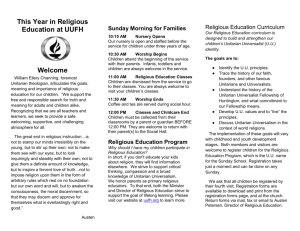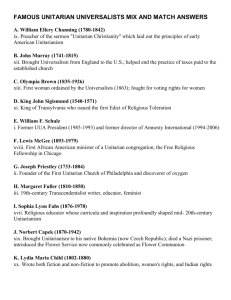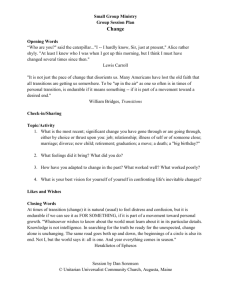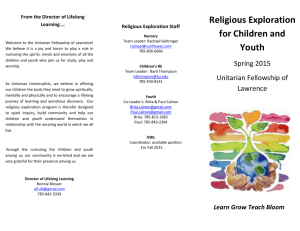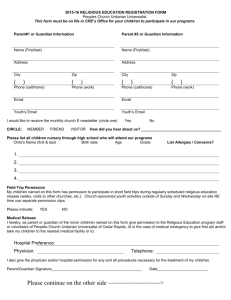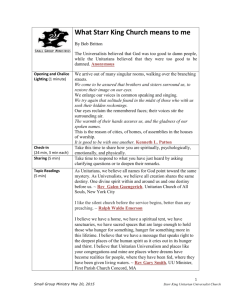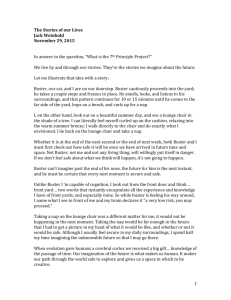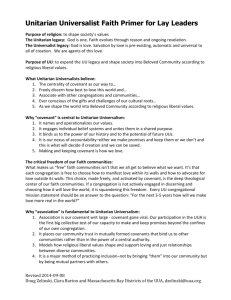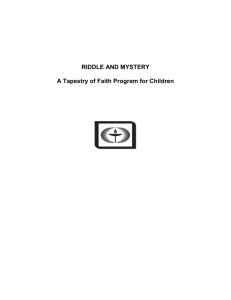THE WI$DOM PATH: MONEY, SPIRIT, AND LIFE A Tapestry of Faith
advertisement
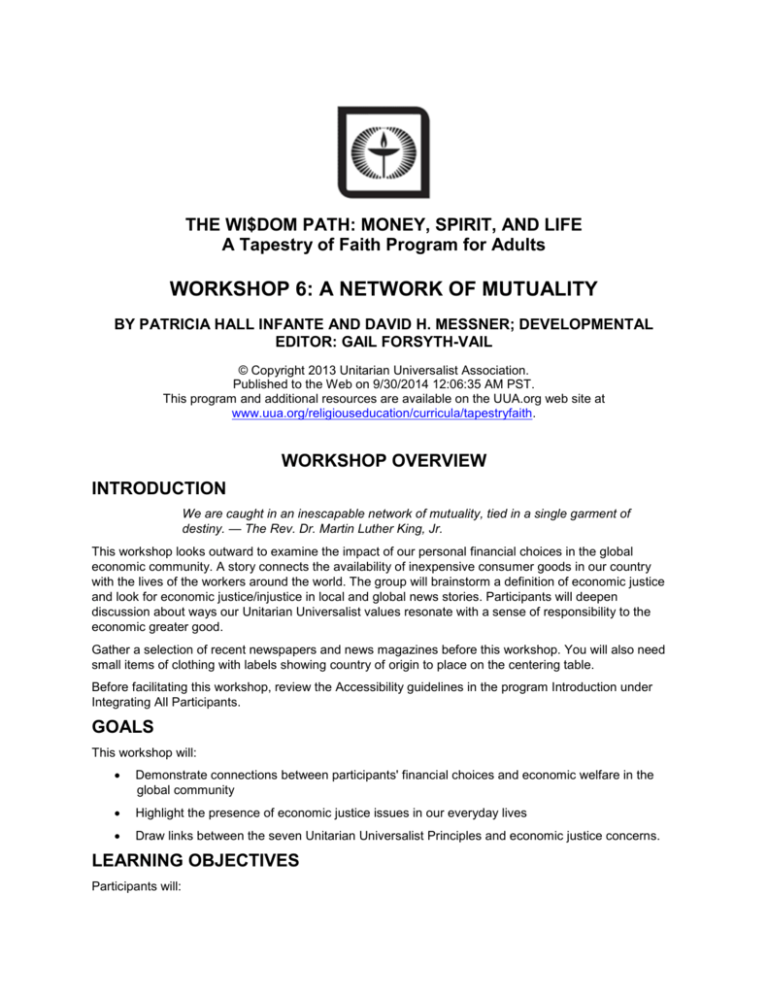
THE WI$DOM PATH: MONEY, SPIRIT, AND LIFE A Tapestry of Faith Program for Adults WORKSHOP 6: A NETWORK OF MUTUALITY BY PATRICIA HALL INFANTE AND DAVID H. MESSNER; DEVELOPMENTAL EDITOR: GAIL FORSYTH-VAIL © Copyright 2013 Unitarian Universalist Association. Published to the Web on 9/30/2014 12:06:35 AM PST. This program and additional resources are available on the UUA.org web site at www.uua.org/religiouseducation/curricula/tapestryfaith. WORKSHOP OVERVIEW INTRODUCTION We are caught in an inescapable network of mutuality, tied in a single garment of destiny. — The Rev. Dr. Martin Luther King, Jr. This workshop looks outward to examine the impact of our personal financial choices in the global economic community. A story connects the availability of inexpensive consumer goods in our country with the lives of the workers around the world. The group will brainstorm a definition of economic justice and look for economic justice/injustice in local and global news stories. Participants will deepen discussion about ways our Unitarian Universalist values resonate with a sense of responsibility to the economic greater good. Gather a selection of recent newspapers and news magazines before this workshop. You will also need small items of clothing with labels showing country of origin to place on the centering table. Before facilitating this workshop, review the Accessibility guidelines in the program Introduction under Integrating All Participants. GOALS This workshop will: Demonstrate connections between participants' financial choices and economic welfare in the global community Highlight the presence of economic justice issues in our everyday lives Draw links between the seven Unitarian Universalist Principles and economic justice concerns. LEARNING OBJECTIVES Participants will: Understand that the interdependence of our global community ensures that our financial choices affect others Create a definition of economic justice and apply the definition to study local and national issues Use the Unitarian Universalist Principles as a lens for exploring the impact of our individual and collective financial decisions across the planet. WORKSHOP-AT-A-GLANCE Activity Minutes Opening 15 Activity 1: Where in the World? 30 Activity 2: Defining Economic Justice 15 Activity 3: Our Principles at Work 25 Faith in Action: Economic Justice Issues and Local Government Closing 5 Alternate Activity 1: Women Workers Speak Out 30 SPIRITUAL PREPARATION Use the discussion questions from Activity 2 and Activity 3 to reflect on the topic of economic justice. Explore the wonderful collections of stories and resources on the websites of the UUA (at www.uua.org/economic/) and the Unitarian Universalist Service Committee (at www.uusc.org/economicjustice) to gain a broader picture of Unitarian Universalist advocacy and support for economic justice, which may be helpful as grounding for this workshop. WORKSHOP PLAN OPENING (15 MINUTES) Materials for Activity Chalice, candle, and lighter or LED/battery-operated candle A chime or a small bell Newsprint, markers, and tape Several small items of clothing or apparel with labels indicating a non-United States country of origin Copies of Singing the Living Tradition, the Unitarian Universalist hymnbook Optional: Talking stick (or another item to pass to each speaker) Optional: Refreshments Preparation for Activity Gather small items of clothing or apparel labeled as having originated in a country outside the United States. Place chairs in a circle. Set copies of Singing the Living Tradition on chairs. Set a small center table with chalice and lighter. Write agenda for this workshop on newsprint, and post. Write this quote from Hebrew scripture (Jeremiah 22:13) on a sheet of newsprint, and post: Woe to him who builds his house by unrighteousness, and his upper rooms by injustice, who makes his neighbor serve him for nothing and does not give him his wages. Optional: Recruit a song leader to help teach/lead "We're Gonna Sit at the Welcome Table," Hymn 407 in the Unitarian Universalist hymnbook, Singing the Living Tradition. Optional: Set out refreshments. Description of Activity Welcome people into the circle. Sound the chime and invite participants into quiet reflection as you prepare to enter into a time of centering and sharing. Ask a volunteer to light the chalice as you share "O Spinner, Weaver, of Our Lives," Reading 431 in Singing the Living Tradition. Lead the group to sing "We're Gonna Sit at the Welcome Table," Hymn 407 in Singing the Living Tradition. Say that this workshop will continue the exploration of how our financial ways affect others, this time expanding outward to our local communities and the world. Read aloud the quote from Jeremiah 22:13 that you have written on newsprint. Ask, "What meaning might this scripture have for us today?" Allow a moment or two for silent reflection, then invite participants to respond to the quote as they feel comfortable, passing the talking stick if you have chosen to use one. Share these words by the Rev. Rebecca Edmiston-Lange: Mindful of our highest aspirations, Bound by common faith and purpose, And, yet, beginning with ourselves as we are, Let us take one more step, together, in our unending quest for dignity, justice and love. Sound the chime to signal the end of the centering time. Including All Participants If you wish to invite the group to rise and sing, ensure that the option to remain seated is communicated. You may say, "Rise in body or spirit." ACTIVITY 1: WHERE IN THE WORLD? (30 MINUTES) Materials for Activity Story, "Follow Your Labels (included in this document) " Handout 1, Selected Wage Data for Apparel and Footwear Workers (included in this document) A display map of the world or a globe A pad of sticky notes Newsprint, markers, and tape Optional: Talking stick (an object to pass to each speaker) Preparation for Activity Copy Handout 1 for all participants. Use sticky notes to mark the five countries mentioned in Handout 1 on your globe or map, and display where all will be able to see. Ask up to six volunteers to read the story, "Follow Your Labels," aloud. If possible, give the text to volunteers in advance. Write on newsprint, and post: o Does the Fair Trade motto "Every purchase matters" resonate with you? In what way? o Are there times when our behavior as consumers might be at odds with the Unitarian Universalist Principles that affirm justice and acknowledge the interconnectedness of all? o What can you do to more closely align your choices with our UU values? What are the barriers to "doing the right thing?" Description of Activity Distribute Handout 1, Selected Wage Data for Apparel and Footwear Workers. Read the one-paragraph introduction aloud, then give participants a few moments to look over the statistics. Engage a brief conversation about the impact of our economic decisions on people all around the globe. Why do our choices matter to people in places like China or Thailand? What impact do practices and circumstances in other countries have on us? Introduce the story by saying that it comes from a July 2013 Christian Science Monitor article about the impact of the manufacture of inexpensive consumer goods on the lives of the workers who create them. Invite volunteer readers to each read a portion of the story aloud. After a few moments of silence, ask for initial responses. Then, offer the posted reflection questions, one at a time, inviting each person in the circle an opportunity to respond (or pass) before moving on to the next question. Encourage active listening and discourage interruption and side conversations; you may wish to use a talking stick. Variations If the group is larger than ten, form two or more circles so each person will have adequate opportunity to share. If there is time remaining after all three questions have been addressed, open the discussion for more robust dialogue. ACTIVITY 2: DEFINING ECONOMIC JUSTICE (15 MINUTES) Materials for Activity Newsprint, markers, and tape Selection of recent newspapers and news magazines Preparation for Activity Gather current newspapers and news magazines that cover current issues which have an economic justice angle. You will need enough so that each pair of participants will encounter several issues related to economic justice or injustice at play in the local and/or global community. Write this definition of "economic justice" (from www.businessdictionary.com) on newsprint, and set aside: Economic justice: The basic and well accepted principle of fairness where the consequence of official policies should be the equal allocation of benefits among participants in an economy. For example, implementing policies that reflect the goal of economic justice might involve eliminating discriminatory hiring practices and permitting people to work freely where their business skills are required. Post blank newsprint. Description of Activity Invite participants to brainstorm words and concepts for a definition of economic justice. Capture their ideas on newsprint. After several minutes, post the newsprint on which you wrote the definition from businessdictionary.com. Acknowledge that this is just one; there are other definitions. Invite participants to compare the group's list of key words and concepts with the posted definition. Ask: Who is included in the phrase "participants in an economy?" How would you expand or alter the dictionary definition? If we expand the definition to encompass the global community, what would we need to change? Distribute newspapers and news magazines. Ask participants to work alone or in small groups to find an article that illustrates an issue of economic justice or injustice at play in their local communities and in the global community. After about five minutes, ask several people to share a headline and/or a very brief synopsis of a story they have found. Invite discussion on the way in which the impact of economic injustice is a part of everyday life, both locally and globally. ACTIVITY 3: OUR PRINCIPLES AT WORK (25 MINUTES) Materials for Activity Newsprint, markers, and tape Paper, pens, and markers A timepiece and a chime or small bell Optional: A poster of the seven Unitarian Universalist Principles or copies of Singing the Living Tradition, the Unitarian Universalist hymnbook Preparation for Activity Arrange for participants to have comfortable places for writing. Write the seven UU Principles on a sheet of newsprint, and post. Or, display a poster of the UU Principles (at www.uuabookstore.org/productdetails.cfm?PC=693) or gather copies of Singing the Living Tradition for participants to share (the Principles follow the Preface) Write on another sheet of newsprint, and post: o How does this Principle guide us in a faithful Unitarian Universalist response to issues of economic justice at home and in the larger world? o How and why are we, as Unitarian Universalists, called to take responsibility for the "greater good?" o What choices of ours diminish, marginalize, or endanger people we don't even know? Why don't we know more about the effects of our choices? Description of Activity Explain that this activity will take place in three parts: time for journaling, conversation in pairs, and group processing. Say that you will use the chime to move participants to the next part. Distribute paper, pens, and markers. Invite participants to find a comfortable spot and take about five minutes for reflection, journaling, or drawing in response to the stories and activities in this workshop. Suggest they consider what parts resonated most deeply with them and why. After about five minutes, sound the chime and help participants form pairs. Assign each pair one UU Principle and ask them to consider the posted questions for about 10 minutes. Sound the chime after eight to ten minutes to re-gather the large group. Invite each pair to offer a highlight or two from their conversation. If you did not have enough pairs to touch on all seven Principles, work together to determine how each remaining Principle guides us in a faithful Unitarian Universalist response to issues of economic justice at home and in the larger world. CLOSING (5 MINUTES) Materials for Activity Chalice, candle, and lighter or LED/battery-operated candle Taking It Home (included in this document) handout Preparation for Activity Customize Taking It Home and make copies for all participants. Description of Activity Distribute Taking It Home. Invite everyone to form a circle and join hands. Ask participants to reflect quietly for a moment and then share a word or phrase that describes one insight or take-away from this workshop. Repeat the reading by the Rev. Rebecca Edmiston-Lange you shared in the workshop Opening: Mindful of our highest aspirations, Bound by common faith and purpose, And, yet, beginning with ourselves as we are, Let us take one more step, together, in our unending quest for dignity, justice and love. Extinguish the chalice. FAITH IN ACTION: ECONOMIC JUSTICE ISSUES AND LOCAL GOVERNMENT Description of Activity Attend a meeting of a local City Council or Board of Selectmen or a local hearing on an issue related to economic justice such as workers' rights, water rights, affordable housing, transit fare increases, or programs that help households meet their basic needs. Observe the proceedings and take notes on how economic justice is or is not supported in your community. Follow up with a letter to your elected officials or a local newspaper or news website offering your observations. LEADER REFLECTION AND PLANNING Make a time for individual reflection and discussion with your co-facilitator after the conclusion of the first workshop. Consider these questions: What worked well in today's workshop? How can these elements or approaches be repeated or amplified in the future? What was most challenging? What could be done to make these parts easier or more effective? At what points were participants most and least engaged? Were all voices in the group heard? Were voices and perspectives shared by people who identify with marginalized groups? Was the room set-up conducive to group functioning? Did you have all of the resources that you needed? Was your practical and spiritual preparation time adequate? Are there opportunities to improve/modify for the next workshop? TAKING IT HOME We are caught in an inescapable network of mutuality, tied in a single garment of destiny. — The Rev. Dr. Martin Luther King, Jr. Spend some time with your apparel and footwear. What can you learn about workers in each item's country of origin? Consider these questions as you examine each piece: What do I know about how the workers in this country are treated? Would I make a different choice if I knew they were not paid a living wage? If I knew the workers lacked access to basic needs such as housing, clean water, and health care? How do my everyday economic decisions ripple out into the world? ALTERNATE ACTIVITY 1: WOMEN WORKERS SPEAK OUT (30 MINUTES) Materials for Activity Pushing Back: Women Workers Speak Out on Trade (at www.uusc.org/video/pushing_back%3A_women_workers_speak_out_on_trade) video from the Unitarian Universalist Service Committee website (18:04) A computer with Internet connection and a projection screen, digital projector, and speakers or a large monitor Preparation for Activity Preview the video. Test equipment and queue the video. Arrange seating so all participants can view the screen and hear the video. Description of Activity Show the video. Then, lead a discussion, using these questions: What parts of this story resonated with you? Why? What is our moral responsibility to support fair labor practices, particularly for marginalized groups in the global community? How can we support fair labor practices? How can we do so through our everyday economic choices? THE WI$DOM PATH: MONEY, SPIRIT, AND LIFE: WORKSHOP 6: STORY: FOLLOW YOUR LABELS "Follow Your Labels: Your Place in the Global Consumer Chain" by Kelsey Timmerman, Christian Science Monitor, July 21, 2013; Kelsey Timmerman regularly speaks at universities, high schools, and groups across the country. Used with permission. [Reader 1] Your morning coffee is a miracle of globalization. Someone somewhere in the world had the faith to plant a seedling that years later would produce small cherries harvested by nimble fingers. And then the coffee bean would be transported down bumpy roads cut into active volcanoes, and across oceans. It would be processed and roasted, and ultimately it would find its way to you. But the miracles don't end at the bottom of your cup of coffee. The blue jeans you slip into before rushing off to work were crafted from swaths of denim in a factory in a country you probably can't find on a map. In a 1967 speech, Martin Luther King Jr. said, "[B]efore you finish eating breakfast in the morning, you've depended on more than half of the world." His words were never truer than today. Almost 98 percent of clothes sold in the United States in 2011 were imported, reports the American Apparel and Footwear Association. And while many Americans are attempting to get closer to their food by purchasing locally, the amount of imported food has doubled since 2000, according to a 2011 US International Trade Commission report. [Reader 2] It's amazing, when you think about it, to eat a banana that traveled thousands of miles from a plantation in Costa Rica. But perhaps more amazing is that so many staples of the American diet—coffee, apple juice, chocolate, to name a few—come from so far away that most of us can't imagine the plants they grow on, let alone the people responsible for producing them. Food and clothing labels become red flags, though, when a tragedy occurs like the April [2013] collapse of the Rana Plaza garment factory in Bangladesh, which killed 1,129 workers. We realize that our shirt was made in Bangladesh, and maybe we bought it at a price that was guilt-free for our budget, but when we see reports on the catastrophe, that shirt might not feel guilt-free any longer. How can we not wonder: Should we stop buying clothes made in Bangladesh? Should we do the same for the food we eat from places that may have similar questionable labor practices? [Reader 3] But the global economy is not so simple. I've picked coffee on an unimaginably steep mountainside in Colombia, hauled 80 pounds of bananas on my back alongside Costa Rican workers, and walked rows of sewing machines in a Bangladeshi factory, and I've witnessed how the line between exploitation and opportunity blurs quickly. Our needs create opportunity for factory workers and farmers abroad, which is good. But are their lives improving because of our demand? The global economy may provide farmers with incentives. But to get a grip on the next rung of the global economic development ladder, farmers see higher wages at urban factories as the answer. And that opportunity can be short lived in a global market that rapidly shifts to find cheaper wages elsewhere, or if middlemen take their cuts and consumers demand still-lower prices. Ai, one of 85 garment workers involved in sewing together a single pair of Levi's on a Cambodian production line, left the fields for the factories. When she was told that some Americans don't want to buy the jeans she makes because they think she should earn more than $55 per month, she quickly replied: "If people don't buy, I'm unhappy because I wouldn't have a job." [Reader 4] Farm-to-factory pressure So can we just shop for our basic needs and take comfort in knowing that the people who make our stuff in faraway factories and grow our food in exotic locales have no better options? Over the past six years I've met garment workers in Bangladesh, Cambodia, China, Honduras, and Ethiopia, and almost every one was a former farmer. Farmers are leaving the fields for the factories, hoping that a job in the city sewing Levi's or assembling iPhones will improve their lives. Farmers aren't just pulled from the fields by opportunities in factories, they are also pushed by dwindling farming opportunities. Many get paid less despite the increased appetites of developed nations for the fruits of their labor. [Reader 5] Coffee is a prime example. Antony Wild, author of "Coffee: A Dark History," writes that in 1991 the value of the global coffee market was $30 billion, of which producing countries received 40 percent. In 2005, the coffee market was worth $70 billion, and producing countries received 10 percent. Gabriel Silva, a former president of the Colombian Coffee Federation, estimates that of the $3 Americans spend on a fancy mocha latte at Starbucks, a farmer gets about 1 cent. Workers in Costa Rica at a Dole banana plantation were paid $28 per day a decade ago, but were down to $20 per day when I visited. One evening I asked one of the veteran workers, who had seen co-workers die from snakebites and had lopped off one of his own fingers with a machete while working, if he had advice for the younger worker sitting next to him. He did: "Find a different career." From his perspective, he saw no opportunities in the fields. Similarly, Bangladeshi seamstress Reshma Begum saw no opportunities in the city factories. After being pulled from the rubble of the Rana Plaza factory where she was buried for 17 days, she ended a press conference with a simple statement: "I will not work in a garment factory again." [Reader 6] So what can you do? Awareness of where and under what conditions your food and clothing come from starts with checking the tag of your jeans and the label on your bag of coffee beans and realizing that every grocery store is a farmers' market and every department store is filled with the work of artisans. Americans are sacrificing a smaller portion of their budgets for food and clothing than ever before; others sacrifice much more. THE WI$DOM PATH: MONEY, SPIRIT, AND LIFE: WORKSHOP 6: HANDOUT 1: SELECTED WAGE DATA FOR APPAREL AND FOOTWEAR WORKERS From "Wages, Benefits, Poverty Line, and Meeting Workers' Needs in the Apparel and Footwear Industries of Selected Countries," a February 2000 report from the US Department of Labor and the Bureau of International Labor Affairs The footwear and apparel industries are some of the low-wage manufacturing industries that have been dramatically affected by the changing patterns of global sourcing and production. The term "living wage" is often used as a synonym for a "fair and decent" level of income that would enable workers to meet their "basic needs." However, there is little agreement on the definition of what exactly constitute "basic needs" or on a methodology to determine the income necessary to meet such needs. While there have been a number of declarations and conventions by regional and international bodies concerning the right of workers to receive an adequate wage, most do not provide a precise definition of how it should be determined. For some, "basic needs" mean mere physical subsistence. For others, "basic needs" include a nutritious diet, safe drinking water, suitable housing, energy, transportation, clothing, health care, child care, education, savings for long term purchases and emergencies, and some discretionary income. Country Poverty Threshold (Converted to US $) Minimum Wage in Apparel & Prevailing (Average) Wage in Footwear Sector (Converted to Apparel & Footwear Sector US $) (Converted to US $) Bangladesh 11.32/mo 12.35-76/mo 36.51-42.51/mo China 12.39/mo 114.67-190.97/mo Guatemala 11.07/day 3.16/day 6.11/day Thailand 22.00/mo 93.37-109.01/mo 106.08/mo United States 16,655/yr(family of 4) 13,000/yr 17,040-17,860 20.50-26.50/mo FIND OUT MORE Online, find resources, stories, and links for economic justice initiatives (at www.uua.org/economic/) of the Unitarian Universalist Association and stories and resources on economic justice (at www.uusc.org/economicjustice) issues such as compassionate consumption, fair wages and fair trade from the Unitarian Universalist Service Committee. The Christian Science Monitor website offers the original version of this workshop's story, "Follow Your Labels" online, where you can also watch a video interview (at www.csmonitor.com/World/GlobalIssues/2013/0721/Follow-your-labels-Your-place-in-the-global-consumer-chain) (16:20) with the author, Kelsey Timmerman, about his research beginning with a trip to Honduras to pursue this story. The website 100 Under $100: The Women's Global Tool Kit (at www.womensglobaltoolkit.com/) provides stories and links to help consumers and advocates learn about business initiatives of and for women around the world.
